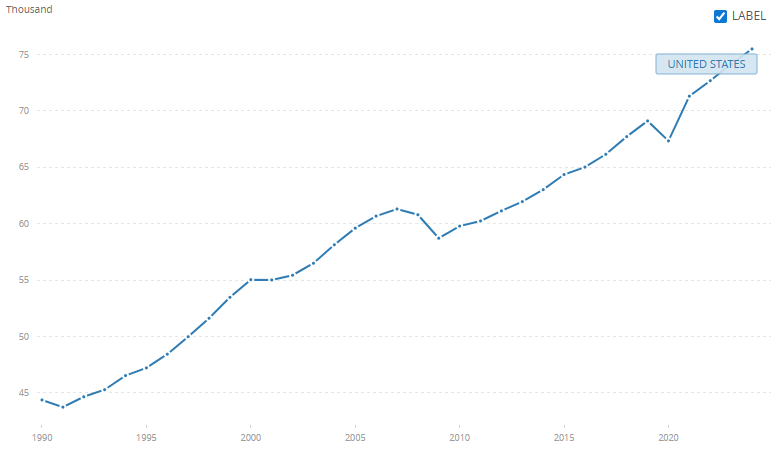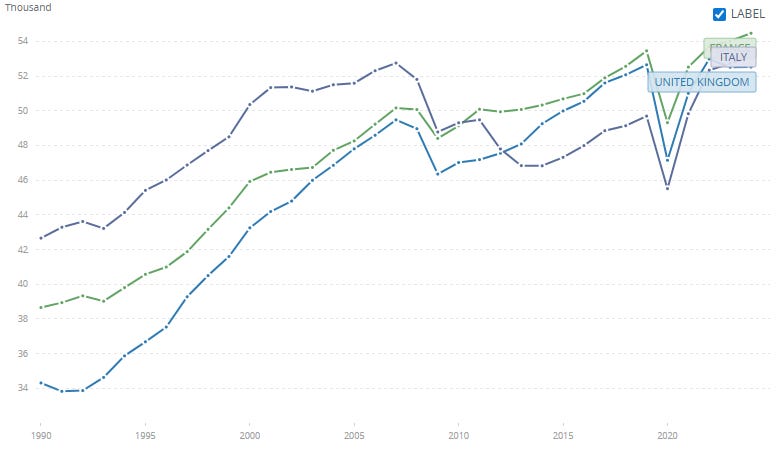The Giant Engine That Could
A case for optimism

It’s time for some optimism.
The US has gone through a somewhat chaotic first quarter of the 21st century. Over the last 25 years we have seen three “generational-defining” events, each one larger than the last: September 11th, the Great Recession, and Covid. Furthermore, our political system has transformed regular government business into a series of angry confrontations, ranging from immigration to Supreme Court nominations. Some of this is driven by media sensationalism, still more by the internet. That said, any objective observer would conclude the century thus far has shaped up to be uneven, at best. One would think all this disorder would have slowly resulted in stagnation, if not impoverishment.
Yet through it all there has been one force that has continually plugged away. One gigantic behemoth that continues to not only chug forward but improve. An entity that is unlike anything the world has ever seen. The US economy. Despite all the unpredictability and mess, the US economy has continued to grow. Not only grow, but grow at a decent clip. Not only grow in an absolute sense, but grow on a per person basis. Not only grow in one area or industry, but around the country and across many industries. The US economy has defied gravity for decades, continually building wealth and efficiency. It has evolved and improved with a seemingly unstoppable dynamism.
Take a look at US GDP per capita since 1990. The chart below has been corrected for inflation and accounts for the cost of living in the US relative to other countries (something economists call Purchasing Power Parity, or PPP). In other words, it shows real economic growth on a per person basis over time.
This is nothing short of extraordinary. Despite the deadliest terrorist attack in world history, two wars, the largest economic recession in living memory, and a pandemic, the world’s largest economy has only grown larger. September 11 caused economic growth to briefly halt, but not reverse. The Great Recession caused a significant decline in the economy, but a decline that was erased within six years. Covid is just a one-year blip that doesn’t appear to have had any effect on the medium-term trend. This is not normal. Economies, especially wealthy ones, often grow unsteadily, if they grow at all. America, on the other hand, has grown by 23 percent since 2007, the peak year for many nations before the Great Recession. Looking at other wealthy countries shows just how exceptional that is. Compare the experience of the US to that of Italy, France, and the United Kingdom:
After a great 1990s, we see stagnation. France (the green line) has done alright. Their rapid economic growth in the 1990s looks similar to the United States. Then, as with so many countries, growth largely plateaus. From 2007 through 2024 the French economy only grew by 8.6 percent per person. That’s not much, but it is better than the United Kingdom and Italy. The British economy only grew by six percent over that same span, and hasn’t grown at all since 2019. Italian growth has flatlined for 20 years, and is barely higher today than it was in 2004. An entire generation of no growth. Looking around the world at other nations that the World Bank has designated as high income, we see similar slow growth:
Japan has dealt with anemic growth for decades. Russian growth has been in fits and starts. The Saudis, once far wealthier than the United States, peaked in the 1990s and have yet to recover. New Zealand plugs away but has only grown 14 percent since 2007. Around the world wealthy countries have generally seen similar trends. Even Canada’s economy, which stands to gain more than anyone from American growth, has only grown by five percent since 2007.
There are a few exceptions:
South Korea, as always, stands as the best performer. Poland’s success is the most underreported economic news of the post-Cold War era. Both nations’ economies have grown by around 50 percent over the last 20 years. Both these nations, however, remain significantly poorer than the United States. Australia has shown consistent growth, but at a slower pace than the US. Of countries that began 2007 at a similar or higher wealth level than the US, few have performed as well since. Norway is still wealthier than the US, but has barely grown much since 2007. The Netherlands is doing ok.
The growth of the US economy was not foreordained. Far from it. During the depths of the Great Recession, many predicted the US was going to enter the exact type of stagnation it avoided but befell the United Kingdom and Italy. More than a few people said the US experience was proof that Europe’s balance of stronger government and lower work hours would be superior going forward. The journalist Matt Yglesias recently had an admirable mea culpa about how he made this very mistake. The reality has been the complete opposite. The US has left many of its former peers behind.
One can accurately say that the economy isn’t everything. There is some truth that this growth has come at the expense of the environment, or that the gains in the economy aren’t being shared equally. There are systemic problems with the housing market. Our energy grid needs to evolve. There’s no guarantee this growth will continue. Naysayers can point to all the other things we need to improve on in our society. I’ve written about many of them.
But one can recognize areas needing improvement as well as successes. We should enjoy that the economy has done extremely well in America. As Alex Tabarrok recently put it on the Marginal Revolution blog:
Every generation launches a new competitor to America and the people who don’t like capitalism and America’s individualist, free market economy trumpet that now the American way is being left in the dust. In the progressive era it was the Germans (how did that work out?), then it was the Russians (remember Sputnik?), then it was the Japanese (buying up Rockefeller center! the horror!), then it was the Chinese (look at those high speed rail lines!). My message to Americans is to double down on America. Double down on immigration, entrepreneurship, innovation, building for tomorrow, free markets, free speech and individualism and America will take all new competitors as it has taken all comers in the past. The world should be more like America not the other way around.
This economic growth isn’t only numbers. It has bettered people’s lives. Life expectancy in America has significantly increased since 1990. Crime has gone down. Poverty has more than halved. The average American today lives a better life than their parents, let alone their grandparents. In large part this is because of the giant engine that could: the American Economy.






I didn't make it past the first paragraph. You missed the Iraq War and the Afghan War – i.e. the "Global War on Terror." I hear this from time to time. Your list is the same as every other list (9/11, ... , Recession, Covid), which leaves out Iraq & Afghanistan, not to Mention Katrina. Have people really just forgotten these things? They seem enormous to me, for obvious reasons, but appear to have barely registered on the radar of the middle class. What gives?